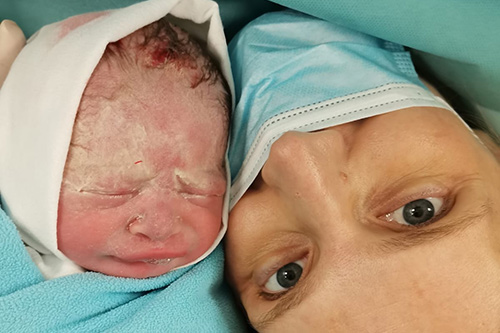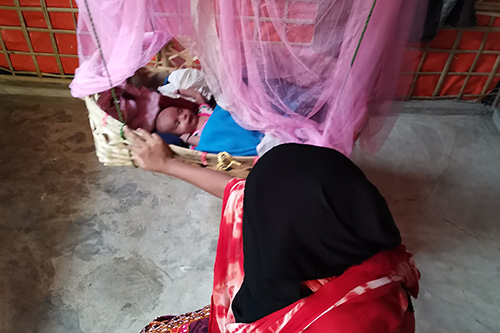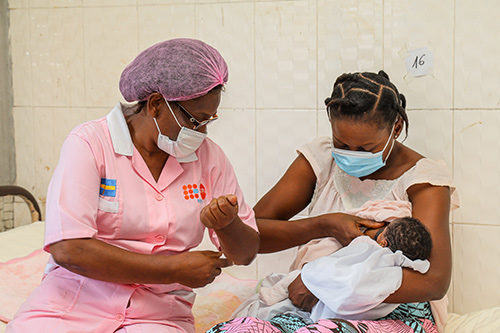UNITED NATIONS, New York ‒ “We were all alone, all the time,” Tatuli Paghava, 31, told UNFPA in Georgia, explaining how the COVID-19 pandemic has intensified hardships for mothers.
“Everything got harder... especially for the mothers who are doing everything alone,” added Ani Mardaleishvili, 32, also in Georgia. She works in finance and also manages her 4-year-old daughter’s remote learning. “And I’m expecting a second child soon,” she said.
Mothers already shouldered tremendous financial, physical, emotional, and intellectual burdens before the onset of the pandemic. But now ‒ under increasing economic pressures, attenuated access to health care, diminishing social support and growing unpaid care responsibilities ‒ many of these burdens have become crushing.
All of this is taking a toll on the long-term health and welfare of mothers. Women have been disproportionately affected by pandemic-related job losses, and researchers are starting to see signs of rising stillbirths, maternal mortality and poor maternal health outcomes around the world.
Asking the impossible
Even under normal conditions, mothers face extraordinary expectations that often defy science and reality. It begins during pregnancy, women around the world told UNFPA.
Suhail Imad Kazem, a nurse in Iraq, was given this advice: “‘Don't eat lemon when pregnant because the baby will be bold,’” she recalled, laughing.
“‘Eat nuts for an intelligent child,’” Najla Hamid, a medical doctor in Iraq, said she was told.
“I have been advised not to watch horror movies,” Ms. Mardaleishvili said. “Why should watching a horror movie be a problem? I don’t know.”
“The funniest thing I have been asked during my pregnancy is that I should not scratch my belly because my son will be born hairless,” said Rafca, in Lebanon.

The unrealistic expectations only continue into motherhood. “I was told that, should I drink too much water, the child will urinate a lot. That was the strangest advice I received during my postpartum period," Sangrila, 31, in Nepal, said.
But the demands are not always so light-hearted. Some women face intense pressure to have sons rather than daughters, reinforcing gender inequalities and discrimination. “People were insisting that I have a male child,” said one Syrian mother in frustration.
In many places, women must perform hard labour during pregnancy. "During the time of my pregnancy, I was told to work on the farm,” recalled Naikya Devi Maharjan, 42, a mother of four from Nepal. “We would get no time to rest. We had to work on the farm and also at home."
And many women get no reprieve even while they recover from childbirth and learn to care for their newborns. “As a young mother, I had no experience with taking care of a baby,” explained Vivian Omondi, an 18 year old with a 3-month-old baby in Kenya. “It’s also been hard balancing schoolwork and being a mother.”
COVID-19: A crisis for mothers
Now, under the pandemic, many mothers have lost support and stability.
“There is no business, no money. People are not working... it brings stress, so it is a bad year,” said Babirye Aisha, a Ugandan woman living in South Sudan.
“Explaining all this to children in the right way can be hard,” Ms. Mardaleishvili said.

Pregnant women are also seeing barriers to health-care access, as well as rampant misinformation about the pandemic. “Someone told me that drinking chamomile tea was useful for me and my child and prevented us from being infected with the COVID-19 virus,” said one pregnant woman in Aleppo, Syria.
Many are uncertain whether and how often to seek maternal health services. “I felt the need to avoid health institutions for my prenatal checkups,” Amira Cerimagic told UNFPA in Sarajevo, Bosnia and Herzegovina. “I didn’t feel it was that safe to give birth in a hospital.”
Ms. Cerimagic was, fortunately, able to safely deliver at home with a midwife. But similar fears are widespread around the world, raising concerns that women may resort to delivering without skilled care – which can be dangerous, and even deadly, if complications arise.
“Patients fear that they'll be infected with COVID-19 if they go to the facility,” Noreen Ada, a nurse in the Philippines, explained. “There were a lot of attempted home deliveries.”
These anxieties, as well as challenges like transport limitations and food insecurity, have “had a negative impact on their reproductive health,” said Dr. Laeila, in Syria. “This has increased the number of miscarriages” as well as anaemia and other problems, she said.
Nurse Kazem, in Iraq, said she and other health workers have stepped up efforts to make pregnant women and new mothers feel safe: “It is crucial to ensure the provision of services and give them the feeling of safety they lack.”
The role of safeguarding new and expectant mothers often falls to midwives – who have themselves faced sharply increased workplace and caretaking burdens.

“Our responsibility increased. It was essential to take care of ourselves, share awareness in order to protect the pregnant women we are home visiting, and to protect our families whenever we are back home,” said Roua Abdel Sater, a midwife and mother of two in Lebanon.
UNFPA is working to increase support for midwives, including through infection control training and the provision of personal protective equipment. UNFPA is also supporting telemedicine and mobile clinics to improve women’s access to life-saving antenatal care and sexual and reproductive health services.
But the longer-lasting solution to these greatly unequal burdens on mothers – gender equality, social norms that value and support mothers, and programmes to ensure their health and well-being – remain distant goals.
Society must stop asking, and expecting, mothers to do the impossible. It may be hard to imagine, but a better world for mothers is possible.


